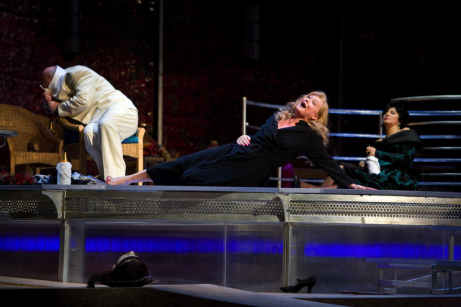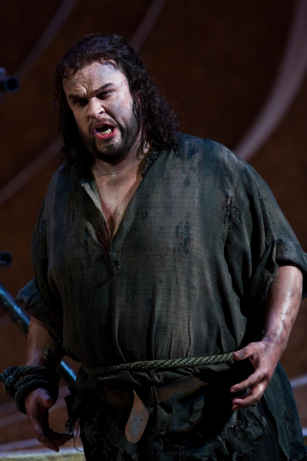Other Links
Editorial Board
- Editor - Bill Kenny
Founder - Len Mullenger
Google Site Search
SEEN
AND HEARD INTERNATIONAL OPERA REVIEW
Richard Strauss, Salome:
Soloists, Metropolitan Opera Orchestra. Patrick Summers (conductor)
Metropolitan Opera. 16.10.2008. (BH)
Salome:
Karita Mattila
Herod:
Kim Begley
Herodias:
Ildikó Komlósi
Jochanaan:
Juha Uusitalo
Narraboth:
Joseph Kaiser
Page:
Lucy Schaufer
Jew:
Allan Glassman
Jew:
Mark Schowalter
Jew:
Adam Klein
Jew:
John Easterlin
Jew:
James Courtney
Nazarene:
Morris Robinson
Nazarene:
Donovan Singletary
Soldier:
Keith Miller
Soldier:
Richard Bernstein
Cappadocian:
David Won
Slave:
Reveka Evangelia Mavrovitis
Executioner:
Reginald Braithwaite
Conductor:
Patrick Summers
Production:
Jürgen Flimm
Designer:
Santo Loquasto
Lighting designer:
James F. Ingalls
Choreographer:
Doug Varone
The big news this time around was in some of the other cast changes,
most notably, the Finnish bass-baritone 
Kim Begley, Karita Mattila and Ildikó Komlósi
Yes, Mattila is slightly older and more voluptuous than before,
although I challenge anyone at her age to disrobe with such glee,
and command the stage with the kind of abandon only great artists
can. What makes her so memorable is that she is not afraid to look
delve into the character even when it makes "Mattila, the person"
look awkward. Whether gaily tripping down a wooden beam or sitting
in a chair, lasciviously kicking her feet up, she is always
inhabiting "sixteen-year-old girl," and not shy about showing her
disparate thoughts and emotions. And all of this is even before
comments on her singing: suffice to say that she still nails the
part with impressive control, accuracy, volume and tone, perhaps
this time adding a few low growls where appropriate. It was a
stunning performance.
The conductor this time was Patrick Summers (replacing Mikko Franck,
who was ill), who led a generally moderately paced reading—still
exciting, make no mistake—but in contrast to Valery Gergiev's almost
reckless speeds four years ago. In the final scene, Summers's more
expansive pace may have snapped the tension for some, but I found
much to enjoy in Mattila and the orchestra on a slightly more
leisurely ride to the finish line. Summers did manage even more
piquant colors from the Met Orchestra, lingering on some of
Strauss's more sordid details in the low brass, and extracting
excruciating tension from the big orchestral chords.

Juha Uusitalo
J
Note: I also caught the high-definition video broadcast (which will
be encored on November 15), notable for the camera's cutting away
during Mattila's brief flash of nudity during the "Dance of the
Seven Veils." While I don't quite understand why necrophilia is
somehow more acceptable, perhaps this mild censorship portends a DVD
release. In any case, the filmed version makes highly effective use
of close-ups. If certain shots reveal Mattila's real age
unflinchingly, never mind. Her harrowing portrayal is given
thrilling new intimacy.
Bruce Hodges
Pictures: Courtesy of Metropolitan
Opera, New York
Back
to Top
Cumulative Index Page
